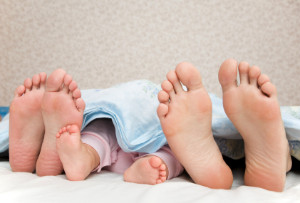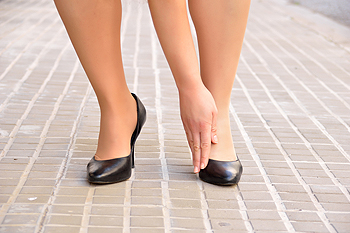Items filtered by date: May 2021
Symptoms of Diabetic Neuropathy
 Diabetic neuropathy is a common complication of diabetes that causes nerve damage in the hands and feet. Neuropathy tends to develop slowly, sometimes over several decades, so people with diabetes are urged to closely monitor their foot health. The symptoms of diabetic neuropathy include a “pins and needles” sensation in the feet, sensitivity to touch or a loss of touch, pain, numbness, tingling, burning, difficulties with coordination while walking, and muscle weakness. Diabetic neuropathy can be dangerous and lead to serious complications, as the loss of sensation that it causes in the feet can make foot wounds more likely to form. These wounds tend to heal poorly and may become infected. If you have diabetes, a podiatrist can help you maintain the health of your feet.
Diabetic neuropathy is a common complication of diabetes that causes nerve damage in the hands and feet. Neuropathy tends to develop slowly, sometimes over several decades, so people with diabetes are urged to closely monitor their foot health. The symptoms of diabetic neuropathy include a “pins and needles” sensation in the feet, sensitivity to touch or a loss of touch, pain, numbness, tingling, burning, difficulties with coordination while walking, and muscle weakness. Diabetic neuropathy can be dangerous and lead to serious complications, as the loss of sensation that it causes in the feet can make foot wounds more likely to form. These wounds tend to heal poorly and may become infected. If you have diabetes, a podiatrist can help you maintain the health of your feet.
Neuropathy
Neuropathy can be a potentially serious condition, especially if it is left undiagnosed. If you have any concerns that you may be experiencing nerve loss in your feet, consult with one of our podiatrists from Parkwood Podiatry. Our doctors will assess your condition and provide you with quality foot and ankle treatment for neuropathy.
What Is Neuropathy?
Neuropathy is a condition that leads to damage to the nerves in the body. Peripheral neuropathy, or neuropathy that affects your peripheral nervous system, usually occurs in the feet. Neuropathy can be triggered by a number of different causes. Such causes include diabetes, infections, cancers, disorders, and toxic substances.
Symptoms of Neuropathy Include:
- Numbness
- Sensation loss
- Prickling and tingling sensations
- Throbbing, freezing, burning pains
- Muscle weakness
Those with diabetes are at serious risk due to being unable to feel an ulcer on their feet. Diabetics usually also suffer from poor blood circulation. This can lead to the wound not healing, infections occurring, and the limb may have to be amputated.
Treatment
To treat neuropathy in the foot, podiatrists will first diagnose the cause of the neuropathy. Figuring out the underlying cause of the neuropathy will allow the podiatrist to prescribe the best treatment, whether it be caused by diabetes, toxic substance exposure, infection, etc. If the nerve has not died, then it’s possible that sensation may be able to return to the foot.
Pain medication may be issued for pain. Electrical nerve stimulation can be used to stimulate nerves. If the neuropathy is caused from pressure on the nerves, then surgery may be necessary.
If you have any questions, please feel free to contact our offices located in Brunswick and Hinesville, GA . We offer the newest diagnostic and treatment technologies for all your foot care needs.
Congenital Foot Deformities
 When a baby is born, people will sometimes use the expression “10 fingers and 10 toes” to reference the newborn’s good health. But what if there is a problem with those 10 (or more) toes? Congenital foot deformities are differences in the structure of a baby’s feet that are present from birth. Fortunately, most of these conditions are treatable and do not cause any serious complications. Clubfoot is a deformity in which the baby’s feet are twisted inwards at the ankle. This generally does not cause any pain, but may interfere with walking later on. It can be corrected through a series of braces and casts. Metatarsus adductus is a common deformity in which part of the child’s foot turns inwards. Most cases resolve on their own, and stretching exercises or casts and orthotics can help those that don’t. Polydactyly is a mutation in which the baby has extra toes. Treatment will depend on the location and functionality of the extra toes, but may include surgery once the child is a little bit older. If you have any concerns about your baby’s foot health please consult with a podiatrist.
When a baby is born, people will sometimes use the expression “10 fingers and 10 toes” to reference the newborn’s good health. But what if there is a problem with those 10 (or more) toes? Congenital foot deformities are differences in the structure of a baby’s feet that are present from birth. Fortunately, most of these conditions are treatable and do not cause any serious complications. Clubfoot is a deformity in which the baby’s feet are twisted inwards at the ankle. This generally does not cause any pain, but may interfere with walking later on. It can be corrected through a series of braces and casts. Metatarsus adductus is a common deformity in which part of the child’s foot turns inwards. Most cases resolve on their own, and stretching exercises or casts and orthotics can help those that don’t. Polydactyly is a mutation in which the baby has extra toes. Treatment will depend on the location and functionality of the extra toes, but may include surgery once the child is a little bit older. If you have any concerns about your baby’s foot health please consult with a podiatrist.
Making sure that your children maintain good foot health is very important as they grow. If you have any questions, contact one of our podiatrists of Parkwood Podiatry. Our doctors can provide the care you need to keep you pain-free and on your feet.
Keeping Children's Feet Healthy
Having healthy feet during childhood can help prevent medical problems later in life, namely in the back and legs. As children grow, their feet require different types of care. Here are some things to consider...
Although babies do not walk yet, it is still very important to take care of their feet.
Avoid putting tight shoes or socks on his or her feet.
Allow the baby to stretch and kick his or her feet to feel comfortable.
As a toddler, kids are now on the move and begin to develop differently. At this age, toddlers are getting a feel for walking, so don’t be alarmed if your toddler is unsteady or ‘walks funny’.
As your child gets older, it is important to teach them how to take care of their feet.
Show them proper hygiene to prevent infections such as fungus.
Be watchful for any pain or injury.
Have all injuries checked by a doctor as soon as possible.
Comfortable, protective shoes should always be worn, especially at play.
If you have any questions please feel free to contact our offices located in Brunswick and Hinesville, GA . We offer the newest diagnostic and treatment technologies for all your foot and ankle needs.
How a Podiatrist Can Help You
 Medical doctors who specialize in treating the lower legs and feet are known as podiatrists. They can treat issues that stem from both injuries as well as medical conditions, like diabetes, and they can perform surgeries, reset broken bones, run tests and prescribe medications. Because diabetes can cause patients to not get enough blood to their feet, regular podiatrist visits can help prevent severe issues in diabetics that can lead to amputation. Patients who are suffering from heel pain should visit a podiatrist because of the stability the heel provides. Podiatrists can also help patients with skin conditions such as corns, calluses, warts, and Athlete’s foot. Toenail issues such as ingrown toenails or fungal nail infections can be treated by podiatrists as well. If you are experiencing issues with your feet, visiting a podiatrist for help is suggested.
Medical doctors who specialize in treating the lower legs and feet are known as podiatrists. They can treat issues that stem from both injuries as well as medical conditions, like diabetes, and they can perform surgeries, reset broken bones, run tests and prescribe medications. Because diabetes can cause patients to not get enough blood to their feet, regular podiatrist visits can help prevent severe issues in diabetics that can lead to amputation. Patients who are suffering from heel pain should visit a podiatrist because of the stability the heel provides. Podiatrists can also help patients with skin conditions such as corns, calluses, warts, and Athlete’s foot. Toenail issues such as ingrown toenails or fungal nail infections can be treated by podiatrists as well. If you are experiencing issues with your feet, visiting a podiatrist for help is suggested.
If you are experiencing pain in the feet or ankles, don’t join the stubborn majority refusing treatment. Feel free to contact one of our podiatrists from Parkwood Podiatry. Our doctors can provide the care you need to keep you pain-free and on your feet.
What Is a Podiatrist?
Someone would seek the care of a podiatrist if they have suffered a foot injury or have common foot ailments such as heal spurs, bunions, arch problems, deformities, ingrown toenails, corns, foot and ankle problems, etc.
Podiatric Treatment
A podiatrist will treat the problematic areas of the feet, ankle or lower leg by prescribing the following:
- Physical therapy
- Drugs
- Orthotic inserts or soles
- Surgery on lower extremity fractures
A common podiatric procedure a podiatrist will use is a scanner or force plate which will allow the podiatrist to know the designs of orthotics. Patients are then told to follow a series of tasks to complete the treatment. The computer will scan the foot a see which areas show weight distribution and pressure points. The podiatrist will read the analysis and then determine which treatment plans are available.
If you have any questions please feel free to contact our offices located in Brunswick and Hinesville, GA . We offer the newest diagnostic and treatment technologies for all your foot and ankle needs.
Are You Suffering From Ingrown Toenails?
How High Heels Can Injure the Feet
 While high heels are commonly worn by many women, they can have long term effects on the feet. High heel wearers can walk with shorter and more forceful strides, and their toes are usually in a flexed position. This can put more strain on the muscles since the calf muscles have shortened. Additionally, once a regular high heel wearer goes back to more comfortable shoes like sneakers or flip flops, they are at a greater risk of developing an injury because they are putting their injured feet into a new environment. Ultimately, wearing high heels on a daily basis can lead to issues such as hammertoes, bunions, sprained ankles, fractures and ligament tears. If you are suffering from injuries due to wearing high heels, or you would like tips on how to prevent injuries while wearing high heels, consulting with a podiatrist is recommended. A podiatrist will be able to treat your foot and ankle problems and offer advice on how to prevent future injuries.
While high heels are commonly worn by many women, they can have long term effects on the feet. High heel wearers can walk with shorter and more forceful strides, and their toes are usually in a flexed position. This can put more strain on the muscles since the calf muscles have shortened. Additionally, once a regular high heel wearer goes back to more comfortable shoes like sneakers or flip flops, they are at a greater risk of developing an injury because they are putting their injured feet into a new environment. Ultimately, wearing high heels on a daily basis can lead to issues such as hammertoes, bunions, sprained ankles, fractures and ligament tears. If you are suffering from injuries due to wearing high heels, or you would like tips on how to prevent injuries while wearing high heels, consulting with a podiatrist is recommended. A podiatrist will be able to treat your foot and ankle problems and offer advice on how to prevent future injuries.
High heels have a history of causing foot and ankle problems. If you have any concerns about your feet or ankles, contact one of our podiatrists from Parkwood Podiatry. Our doctors can provide the care you need to keep you pain-free and on your feet.
Effects of High Heels on the Feet
High heels are popular shoes among women because of their many styles and societal appeal. Despite this, high heels can still cause many health problems if worn too frequently.
Which Parts of My Body Will Be Affected by High Heels?
- Ankle Joints
- Achilles Tendon – May shorten and stiffen with prolonged wear
- Balls of the Feet
- Knees – Heels cause the knees to bend constantly, creating stress on them
- Back – They decrease the spine’s ability to absorb shock, which may lead to back pain. The vertebrae of the lower back may compress.
What Kinds of Foot Problems Can Develop from Wearing High Heels?
- Corns
- Calluses
- Hammertoe
- Bunions
- Morton’s Neuroma
- Plantar Fasciitis
How Can I Still Wear High Heels and Maintain Foot Health?
If you want to wear high heeled shoes, make sure that you are not wearing them every day, as this will help prevent long term physical problems. Try wearing thicker heels as opposed to stilettos to distribute weight more evenly across the feet. Always make sure you are wearing the proper shoes for the right occasion, such as sneakers for exercising. If you walk to work, try carrying your heels with you and changing into them once you arrive at work. Adding inserts to your heels can help cushion your feet and absorb shock. Full foot inserts or metatarsal pads are available.
If you have any questions please feel free to contact our offices located in Brunswick and Hinesville, GA . We offer the newest diagnostic and treatment technologies for all your foot and ankle needs.

